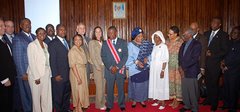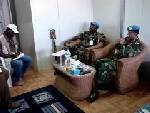
According to reports dozens of former Liberian fighters are seen daily moving into
Speaking to our Correspondent in Ganta, a Guinean soldier who preferred not to be named said it was too rampant at the border, “stay for thirty minutes you will see some of your people come across with bundles, under the pretext that they are going to buy goods,” the soldier in confident told the GNN.
Several others who were interviewed said the were concerned about the situation in neighboring
Before departing the Liberian Guinean border, a warning was being given to all Guinean border Commanders to thoroughly search people entering the country.
Quoting sources from the Guinean Capital, Abul Kamara said it was reported on the international wires that the country’s Prime Minister has warned that unnamed groups are bringing into the country arms and ammunition.
Meanwhile, Guinean Military authority warned that any civilian caught wearing military uniform must be arrested and dealt with militarily. The
According to the BBC, in a strongly worded statement, the
On Thursday, the International Crisis Group think-tank said the violence in
Union leaders and government officials are due to resume talks aimed at ending the crisis on Saturday. In his first public statement since being named a week ago, Prime Minister Eugene Camara said:
"We must not rise up against peaceful citizens, we must not rise up against political parties, nor trade unions. We must rise up against those who have infiltrated arms and ammunition into the country." The military is still deployed on the streets of the capital, to enforce an 18-hour-a-day curfew, while air force planes fly overhead.
Harassment
ICG warned of "a possible civil war comparable to those that have torn apart its neighbors in the past decade with uncontrollable consequences".
Correspondents say the violence has reduced since the introduction of martial law, but there is a great deal of uncertainty. Residents in different
"Under the guise of re-establishing law and order, they're acting like common criminals, beating, robbing and brutalizing the population they're supposed to protect," said Peter Takirambudde, Africa director for Human Rights Watch.
Last month, the unions called off their 18-day strike after Mr Conte promised to hand over powers to a prime minister. But they renewed the strike action call after saying the man Mr Camara, was too close to Mr Conte. The unions want Mr Conte to step down, saying he has mismanaged the economy.
| | |
| |
l



